
This is a modified version of the SCRIPT training slides from 2021-22 that is designed for facilitation over three 2-hour virtual sessions.
- Subject:
- Computer Science
- Education
- Material Type:
- Other
- Author:
- CESA 11
- Date Added:
- 06/17/2022

This is a modified version of the SCRIPT training slides from 2021-22 that is designed for facilitation over three 2-hour virtual sessions.

ABCs of a School Meeting is a self-paced training for educators and families which covers:
Why family involvement matters
Types of school meetings
How to prepare
The importance of effective communication
Techniques to build partnership with your child’s team
The goal of the training is to enable families, teachers and students to have knowledge of the different kinds of school meetings related to disabilities. The takeaway is to look for the best ways to expand communication and build a team with the school and family to support the student with disabilities.
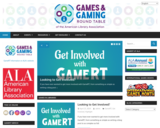
The Games & Gaming Round Table (GameRT) of the American Library Association (ALA) provides a venue for networking and collaboration for library workers interested in the use of games and gaming in libraries. GameRT was formed in 2011 and with members from all types of libraries, GameRT encompasses a wide variety of viewpoints, situations, and user types.
The mission of the GameRT is to:
- Provide a forum for the exchange of ideas and concerns surrounding games in libraries;
- Share resources to the library community that support building and maintaining library game collections;
- Advocate for initiating and supporting game programming in libraries;
- Create an awareness of, and need for, the support of the value of gaming and play in libraries, schools, and related learning communities;
- Create an awareness of the value of games and gaming in library outreach and community engagement plans.

This article provides perceptions of academically resilient students with low-income backgrounds of school counselors. It gives counselors a sense of how students may see them and what they can do to strengthen their school counseling techniques to help increase academic performance.
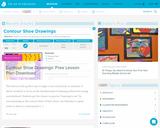
This website has National Standard aligned lesson plans, courses art teachers (and others) can take for credit or professional development, and online magazine, videos, and art conferences.
They cover art: advocacy, assessment, classroom management, creativity, technology, curriculum, differentiation, Instructional strategies, media, techniques, methods, approaches, organization, philosophies, and professional development.
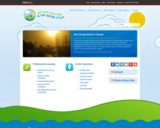
This professional development article describes approaches to using social media in harnessing the power of Web 2.0 technologies to reinforce the connection between multimedia literacy and powerful content-area learning in grades K-5. The emphasis is on collaboration with the school librarian. The article appears in the free online magazine Beyond Weather and the Water Cycle, which is structured around the seven essential principles of the climate sciences.
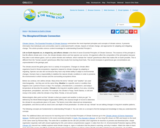
This article continues an examination of each of the seven essential principles of the climate sciences on which the online magazine Beyond Weather and the Water Cycle is structured. Principle 3 states that life on Earth depends on, is shaped by, and affects climate. The climate dictates where and how species can survive. The author discusses the scientific concepts underlying the life forms' dependence on the climate and expands the discussion with diagrams, photos, and online resources.

PDF version of a customizable computer science needs assessment that can be used to gather data from one or more districts.
The live Google Form version can be found here: https://docs.google.com/forms/d/e/1FAIpQLSfdSe7LQLNt5L4LykzgWb0PNwjWfAo7CLs82kUhPSeDGLPj3Q/viewform
Please contact CESA 11 if you would like an editable Google Form version.
![Board Games in the Library [Video Webinar]; presented by David McHugh (Wild Wisconsin Winter Web Conference 2024)](https://img.oercommons.org/160x134/microsite-wi-prod/media/upload/materials/images/Capture_gsFTbQY.JPG)
This video webinar (about integrating board game collections in libraries) was offered by David McHugh (a member of the Teaching Faculty at the University of Wisconsin-Madison iSchool; https://ischool.wisc.edu/staff/mchugh-david/) on Thursday, January 24th, 2024, as a part of the Wild Wisconsin Winter Web Conference (https://www.wildwiscwinterweb.com/) 2024.
Presentation Description: "Board games have never been so popular, with immense social, educational, and creative opportunities for libraries. Join us to learn the key practical considerations for choosing games and organizing game events. Get up to speed on the vast range of hands-on games, from cooperative problem-solvers to Dungeons & Dragons to Pokémon card tournaments. Let the games begin!"

The educator self-assessment can be used by districts to survey classroom teachers and specialists to see how computer science is currently being integrated into individual classrooms. The survey is organized by sections aligned to the Wisconsin CS standards, with individual response questions based on learning priorities within that standards. The results of this educator self-assessment could be used to see how and where CS standards are being taught, to address gaps in computer science instruction, and to identify areas in which educators need additional professional development.
The live Google Forms version can be found here: https://docs.google.com/forms/d/e/1FAIpQLSdkCcBwHv84UK1TXi0VgWngcE1JvCDAFuYq_ttSJ_d3sDVtug/viewform
Please contact CESA 11 if you would like an editable Google Form version.

The educator self-assessment can be used by districts to survey classroom teachers and specialists to see how computer science is currently being integrated into individual classrooms. The survey is organized by sections aligned to the Wisconsin CS standards, with individual response questions based on learning priorities within that standards. The results of this educator self-assessment could be used to see how and where CS standards are being taught, to address gaps in computer science instruction, and to identify areas in which educators need additional professional development.
The live Google Forms version can be found here: https://docs.google.com/forms/d/e/1FAIpQLScSo1-Q0y87e7dj7l-jGGLGeQUe-4dRmeItj9pDTPpEwcKU7A/viewform
Please contact CESA 11 if you would like an editable Google Form version.

The educator self-assessment can be used by districts to survey classroom teachers and specialists to see how computer science is currently being integrated into individual classrooms. The survey is organized by sections aligned to the Wisconsin CS standards, with individual response questions based on learning priorities within that standards. The results of this educator self-assessment could be used to see how and where CS standards are being taught, to address gaps in computer science instruction, and to identify areas in which educators need additional professional development.
The live Google Forms version can be found here: https://docs.google.com/forms/d/e/1FAIpQLSefXpaJkHLhTezTOLZrIEkFNiA5Hnn9JMXm7-1G1mjtXKqVvQ/viewform
Please contact CESA 11 if you would like an editable Google Form version.

The educator self-assessment can be used by districts to survey classroom teachers and specialists to see how computer science is currently being integrated into individual classrooms. The survey is organized by sections aligned to the Wisconsin CS standards, with individual response questions based on learning priorities within that standards. The results of this educator self-assessment could be used to see how and where CS standards are being taught, to address gaps in computer science instruction, and to identify areas in which educators need additional professional development.
The live Google Forms version can be found here: https://docs.google.com/forms/d/e/1FAIpQLSdrMI_EBnml293_X54QAXzWsS5UKbE9TAYdxx3ZXPO9YAH_zQ/viewform
Please contact CESA 11 if you would like an editable Google Form version.
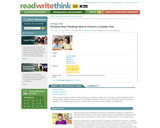
This strategy guide is aimed at helping primary teachers understand the criteria for choosing complex text to use in their classroom. It identifies and explains the components of text complexity and includes a video for teachers to observe a first grade teacher thinking through the process.
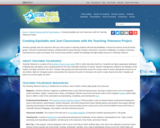
This article provides an overview of Teaching Tolerance, a project of the Southern Poverty Law Center that provides educators with free resources around the areas of equity, justice, and tolerance.
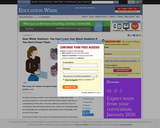
Dr. Bettina Love, professor at University of Georgia, writes about how it isn't enough to "love all students." This article is in Ed Week, published on March 18, 2019.

Developing a Vision for and with Your Child is a self-paced training for educators and families which covers:
What do we mean by vision?
Why is vision important as an advocacy tool?
How can a vision statement support my child at school and in the community?
How do we develop a vision statement?
The goal of the training is to enable families, teachers and students to have a vision of a future. The vision is a work in progress that will develop over time, but sets goals and directions for students with disabilities.

These professional learning materials provide an overview of the K-2 EL Literacy resources. In addition to including information about the purpose of Module lessons, Skills Block lessons, and Labs, the presentation includes information on structure, assessment, and links to helpful tools and videos.
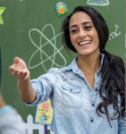
This video collection features strategies for comprehensive literacy instruction for students with significant cognitive disabilities. The purpose of the collection is to support educators and families in understanding how all students can learn and make progress in Common Core English Language Arts standards.
In each video, classroom educators demonstrate research-based instructional strategies in literacy, language and communication including the use of augmentative and alternative communication systems. The videos feature students in both inclusive general education classrooms and self-contained settings.
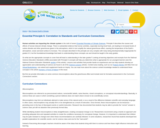
This article explores the alignment of the sixth essential principle of the climate sciences to national science education standards and its connections to the K-5 curriculum. The article also identifies some common misconceptions young students have about weather and climate. The free online magazine Beyond Weather and the Water Cycle focuses on the topics that are appropriate for young learners and introduce them to climate literacy concepts.